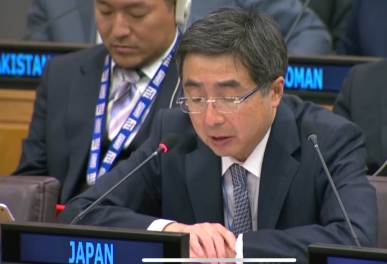第77回国連総会第5委員会主要会期における議題138「2023年国連計画予算案」及び議題139「2023年計画策定」に関する石兼大使ステートメント
令和4年10月12日

Statement by H.E. Ambassador ISHIKANE Kimihiro
Permanent Representative of Japan to the United Nations
Agenda Item 138: Proposed Programme Budget for 2023
and Agenda Item 139: Proposed Programme Plan for 2023
Main Part of the 77th Session of the Fifth Committee
of the United Nations General Assembly
Permanent Representative of Japan to the United Nations
Agenda Item 138: Proposed Programme Budget for 2023
and Agenda Item 139: Proposed Programme Plan for 2023
Main Part of the 77th Session of the Fifth Committee
of the United Nations General Assembly
(Check against delivery)
At the outset, I would like to extend my appreciation to His Excellency Secretary-General António Guterres for introducing the Proposed Programme Budget for 2023. I would also like to thank the Committee for Programme and Coordination and the Advisory Committee on Administrative and Budgetary Questions for their respective reports.
Today we are at a critical juncture, five years since the Secretary-General put forward his progressive proposal to change from a biennial to an annual budget period. This has been one of the most significant changes in the United Nation’s planning and budgeting process for decades.
I believe that the past five years have provided us with an invaluable opportunity to study and review the benefits and advantages as well as the shortcomings, if any, of the proposed modalities through the lens of efficiency, responsiveness, and accountability.
At this 77th session, we have the responsibility to review the initiative and make a final decision on the formalization of the annual budget. Japan supports the overall direction of the reform initiatives led by the Secretary-General and will engage constructively in the discussions.
Mr. Chair,
We note a large number of so-called “Add-Ons” to the budget this year. While we understand the necessity for the UN to remain vigilant, adaptive, and responsive in an ever-changing environment, we should also make the best use of the annual budget cycle to minimize the use of “Add-Ons”. In this connection, we applaud the efforts of the Secretariat to “front-load” resource requirements for 2023 in order to maximize efficiency and transparency.
Mr. Chair,
We also note that the size of the programme budget has been on an upward trend. Given the current global economic situation under the severe influence of soaring inflation including energy and food prices and the lingering COVID-19 pandemic, as well as the additional fiscal burden in many countries due to such volatile situation, it is more critical than ever to ensure the accountability of the UN budget to fiscal authorities and taxpayers of the Member States.
We will carefully assess the overall level of the proposed budget, based on technical evidence and budgetary discipline, to determine a sufficient level of resources for the implementation of the UN’s mandate.
Today we are at a critical juncture, five years since the Secretary-General put forward his progressive proposal to change from a biennial to an annual budget period. This has been one of the most significant changes in the United Nation’s planning and budgeting process for decades.
I believe that the past five years have provided us with an invaluable opportunity to study and review the benefits and advantages as well as the shortcomings, if any, of the proposed modalities through the lens of efficiency, responsiveness, and accountability.
At this 77th session, we have the responsibility to review the initiative and make a final decision on the formalization of the annual budget. Japan supports the overall direction of the reform initiatives led by the Secretary-General and will engage constructively in the discussions.
Mr. Chair,
We note a large number of so-called “Add-Ons” to the budget this year. While we understand the necessity for the UN to remain vigilant, adaptive, and responsive in an ever-changing environment, we should also make the best use of the annual budget cycle to minimize the use of “Add-Ons”. In this connection, we applaud the efforts of the Secretariat to “front-load” resource requirements for 2023 in order to maximize efficiency and transparency.
Mr. Chair,
We also note that the size of the programme budget has been on an upward trend. Given the current global economic situation under the severe influence of soaring inflation including energy and food prices and the lingering COVID-19 pandemic, as well as the additional fiscal burden in many countries due to such volatile situation, it is more critical than ever to ensure the accountability of the UN budget to fiscal authorities and taxpayers of the Member States.
We will carefully assess the overall level of the proposed budget, based on technical evidence and budgetary discipline, to determine a sufficient level of resources for the implementation of the UN’s mandate.
In particular, we will keep a close eye on post resources. While we appreciate those departments which have optimized their staff structures, the proposed budget for 2023 includes 95 more posts than the previous year. We must ensure that the United Nations remains vibrant and innovative, and rationalize any posts and mandates that may be outdated, and to that end, it must take into account the Organization’s rejuvenation strategy, which aims to bring fresher and more diverse talents to the system. With this in mind, Japan will thoroughly review the proposed posts as well as existing ones, especially those that have been long vacant to determine whether they are worth maintaining.
Mr. Chair,
Finally, my delegation remains committed to engaging positively and constructively in the negotiations ahead in order to achieve a consensual outcome on these important agenda items. You can count on my delegation’s full cooperation in this regard.
I thank you, Mr. Chair.
Mr. Chair,
Finally, my delegation remains committed to engaging positively and constructively in the negotiations ahead in order to achieve a consensual outcome on these important agenda items. You can count on my delegation’s full cooperation in this regard.
I thank you, Mr. Chair.
